2019年公共英语一级考试词汇语法全员解析(7)
最新整理公共英语一级考试词汇语法全员解析(5)

公共英语一级考试词汇语法全员解析(5)【形容词,副词】形容词及其用法形容词修饰名词,说明事物或人的性质或特征。
通常,可将形容词分成性质形容词和叙述形容词两类,其位置不一定都放在名词前面。
1)直接说明事物的性质或特征的形容词是性质形容词,它有级的变化,可以用程度副词修饰,在句中可作定语、表语和补语。
例如:h o t热的。
2)叙述形容词只能作表语,所以又称为表语形容词。
这类形容词没有级的变化,也不可用程度副词修饰。
大多数以a开头的形容词都属于这一类。
例如:a f r a i d 害怕的。
(错)H e i s a n i l l m a n.(对)T h e m a n i s i l l. (错)S h e i s a n a f r a i d g i r l.(对)T h e g i r l i s a f r a i d.这类词还有:w e l l,u n w e l l,i l l,f a i n t,a f r a i d,a l i k e,a l i v e,a l o n e,a s l e e p,a w a k e等。
3)形容词作定语修饰名词时,要放在名词的前边。
但是如果形容词修饰以-t h i n g为字尾的词语时,要放在这些词之后,例如:s o m e t h i n g n i c e用形容词表示类别和整体1)某些形容词加上定冠词可以泛指一类人,与谓语动词的复数连接。
如:t h e d e a d,t h e l i v i n g,t h e r i c h,t h e p o o r,t h e b l i n d,t h e h u n g r yT h e p o o r a r e l o s i n g h o p e.2)有关国家和民族的形容词加上定冠词指这个民族的整体,与动词的复数连用。
t h e B r i t i s h,t h e E n g l i s h,t h e F r e n c h,t h e C h i n e s e. T h e E n g l i s h h a v e w o n d e r f u l s e n s e o f h u m o r.以-l y结尾的形容词1)大部分形容词加-l y可构成副词。
2019年公共英语一级真题试卷及答案(精品)

2019年公共英语⼀级真题试卷及答案(精品)公共英语⼀级真题试卷及答案(精品)公共英语⼀级真题试卷(总分83, 做题时间90分钟)第⼀部分听⼒第⼀节图⽚判断在本节中,你将听到10个句⼦,每句话配有A、B、C三幅图⽚,请选择与句⼦内容相符合的⼀幅图⽚,并标在试卷的相应位置。
每句话后有10秒钟的停顿,以便选择图⽚并看下⼀组图⽚。
每句话读两遍。
第⼆节对话应答在本节中,你将听到10个话语,请从A、B、C三个选项中选出⼀个最佳答案,并标在试卷的相应位置。
每个话语后有10秒钟的停顿,以便选择答案和阅读下⼀个⼩题的选项。
每个话语读两遍。
1.A Never mind.B No problem.C You"re welcome.2.A A big surprise.B For a month.C Wonderful.3.A Certainly.B Yes, I do.C Thank you.4.A On May 9th.B Last Sunday.C At nine o"clock.5.A I"ll eat out.B I like cooking.C I"m making cakes.6.A Neither am I.B I"ll come by ship.C Have a good time!7.A It was great!B Good idea!C Of course!8.A It took an hour.B Not too much.C After supper.9.A I"m a teacher.B I live in London.C I"ll leave you some money.10.A My pleasure.B Well done.C All right.第三节对话理解在本节中,你将听到10段对话,每段对话有⼀个问题。
公共英语一级考试的重点单词与词汇
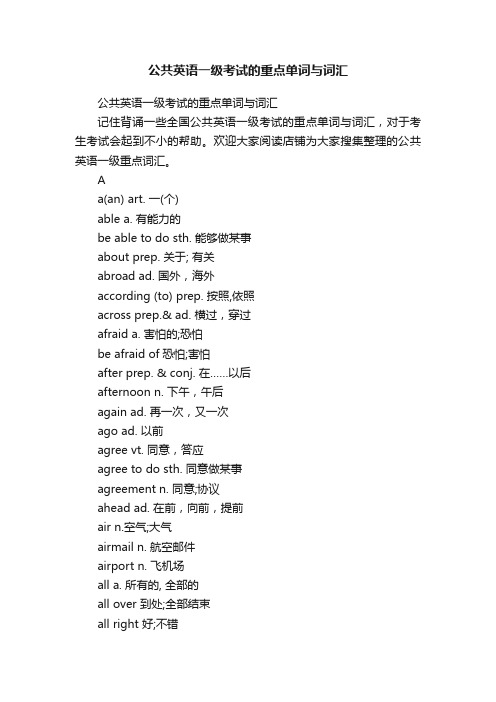
公共英语一级考试的重点单词与词汇公共英语一级考试的重点单词与词汇记住背诵一些全国公共英语一级考试的重点单词与词汇,对于考生考试会起到不小的帮助。
欢迎大家阅读店铺为大家搜集整理的公共英语一级重点词汇。
Aa(an) art. 一(个)able a. 有能力的be able to do sth. 能够做某事about prep. 关于; 有关abroad ad. 国外,海外according (to) prep. 按照,依照across prep.& ad. 横过,穿过afraid a. 害怕的;恐怕be afraid of 恐怕;害怕after prep. & conj. 在……以后afternoon n. 下午,午后again ad. 再一次,又一次ago ad. 以前agree vt. 同意,答应agree to do sth. 同意做某事agreement n. 同意;协议ahead ad. 在前,向前,提前air n.空气;大气airmail n. 航空邮件airport n. 飞机场all a. 所有的, 全部的all over 到处;全部结束all right 好;不错not at all 一点也不;别客气almost ad. 几乎; 差不多:along prep. 沿着already ad. 早已,已(经)also ad. 也,同样always ad. 总是;永远,始终am vi. 是A.M.(=a.m.) 上午America n. 美国, 美洲,American a. 美国(人)的 n. 美国人among prep. 在……之中and conj. 和,与;然而angry a. 愤怒的,生气的be angry with sb. 生某人的气animal n. 动物,牲畜annoy vt. 使愤怒;打扰another a. 再一个;别的one after another 一个接一个answer n. 回答,答复any a. 什么的;任何的anybody pron. 任何人anything pron. 任何事,什么东事apple n. 苹果are vi. 是 be的复数形式arm n. 手臂around ad. & prep. 在周围; 到处arrive vi. 到达,来到arrive at in a place 到达某地as ad.同样地;一样; prep. 当……时候as … as 像……一样not so … as 和……不一样ask vt. 问;请求,询问at prep. 在, 在… 里, 在… 旁at breakfast 在吃早餐at home 在家里at last 终于,最后at once 立即,马上at school 在学校at the same time 同时at work 在工作aunt n. 阿姨, 姑妈, 伯母,舅母autumn n. 秋天away ad. 离开, 在远方be away from 远离, 不在gorun away 逃走Bbaby n. 婴儿back n. 背,背后, 后面bad a. 坏的, 严重的bag n. 袋,包ball n. 球banana n. 香蕉bank n. 银行; 岸basket n. 篮子basketball n. 篮球be v. 是,在bear n. 熊beat vt. 打,击beautiful a. 美丽的because conj. 因为because of 由于,因为become vt. 成为,变为bed n. 床go to bed 上床睡觉make the bed 铺床beef n. 牛肉beer n. 啤酒before prep. 在……之前begin vi. 开始behind prep. 在……后面, 在……背后believe vt. 相信bell n. 钟,铃below prep. 在……下面, 在以下beside prep. 在旁边best a. 最好do one’s best 尽力去做bettera. 较好的had better 最好between prep. 在(两者)之间big a. 大的bike n. 自行车bird n. 鸟birthday n. 生日bit n. 一点a bit (of) 一点儿black a. 黑色的blackboard n. 黑板block n. 街区;障碍物blow vi (blew, blown) 吹;打击blue a. 蓝色的boat n. 小船body n. 身体;物体book n. 书borrow vt. 借入both prep. 两者,双方bother v. 打扰bottle n. 瓶子box n. 盒子boy n. 男孩bread n. 面包break vt. 打破;中断breakfast n. 早餐bridge n. 桥bright a.明亮的bring vt.拿来, 带来brother n. 兄弟brown a. 棕色的brush n. 刷子build vt. 建筑,建立building n. 建筑物,大楼bus n. 公共汽车busy a. 繁忙的be busy doing sth. 忙着做某事be busy with sth. 忙于某事but conj. 但是not only … but also 不仅……而且……buy vt. 购买by prep. 在旁边; 通过by bus car train ship plane air 乘公共汽车小轿车火车船飞机by oneself 独自;单独bye-bye int. 再见Ccallvt. & n. 电话,呼叫, 拜访canaux 能够,会;可以car n. 汽车,小汽车card 纸牌,卡片,名片careful a. 小心的, 细心的carry vt. 运送, 携带case n. 情况;事例cashier n. 出纳员cat n. 猫catch vt. 捉, 患, 赶上catch a cold 得了感冒catch up with sb. 赶上某人center (=centre) n. 中心, 中央certainlyad. 必定,当然:chair n. 椅子change vt. & n. 变化, 改变changeable a. 可变的, 易变的cheap a. 便宜的, 廉价的check(=cheque) n. 支票 vi & vt. 检查,核对check in登记, 签到check out 清帐, 结算China n. 中国Chinese a. 中国的中国人的;n. 中国人, 汉语cineman. 电影院city n. 城市class n. 班, 班级classroom n. 教室close v. 关闭 a. 接近的clothes n.衣服cloud n. 云cloudy a. 有云的,阴天coffee n. 咖啡coke n.可口可乐college n. 学院,大学colo(u)r n. 颜色come vi. 来companyn. 公司computer n. 计算机conversation n. 对话cook n. 厨师 v. 烹调, 煮cool a. 凉爽的copy n. 副本, 抄本corner n. 角落;拐角cost vt. 花费could aux. 能,可能country n. 国家;乡村countryside n. 乡下,农村cover vt. 覆盖be covered with 为…… 所盖credit n. 信任;信用credit card 信用卡cry v. 叫喊;哭喊cup n.杯子cut vt. 切,割;剃下载文档。
Pets1语法整合2019版
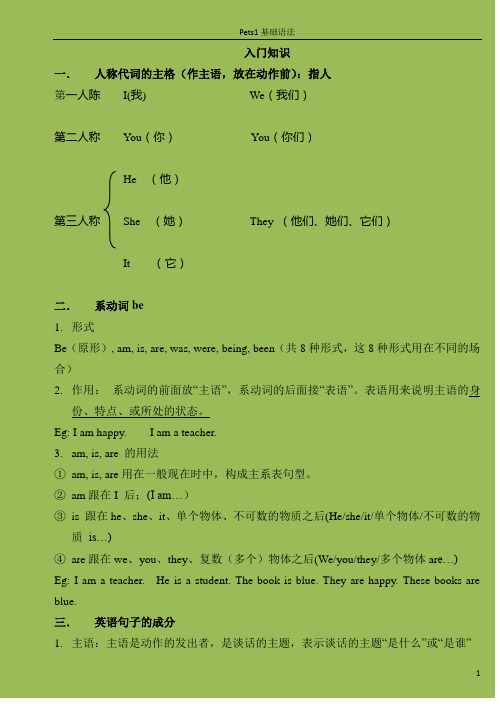
入门知识一.人称代词的主格(作主语,放在动作前):指人第一人陈I(我) We(我们)第二人称You(你)You(你们)He (他)第三人称She (她)They (他们、她们、它们)It (它)二.系动词be1.形式Be(原形), am, is, are, was, were, being, been(共8种形式,这8种形式用在不同的场合)2.作用:系动词的前面放“主语”,系动词的后面接“表语”。
表语用来说明主语的身份、特点、或所处的状态。
Eg: I am happy. I am a teacher.3.am, is, are 的用法①am, is, are用在一般现在时中,构成主系表句型。
②am跟在I 后;(I am…)③is 跟在he、she、it、单个物体、不可数的物质之后(He/she/it/单个物体/不可数的物质is…)④are跟在we、you、they、复数(多个)物体之后(We/you/they/多个物体ar e…) Eg: I am a teacher. He is a student. The book is blue. They are happy. These books are blue.三.英语句子的成分1.主语:主语是动作的发出者,是谈话的主题,表示谈话的主题“是什么”或“是谁”Eg: We study. The boy is seven.2.谓语:谓语主语发出的动作,用来说明主语“干什么”,“是什么”或“怎么样”。
Eg: I like apples.3.宾语:宾语是动作的对象(承受者)Eg: We help you.注意:句子必须有主语和谓语。
4.表语:表语跟在系动词(be)之后。
表语用来说明主语的身份、特点或状态。
系动词和表语构成一个整体,这个整体其实就是句子的谓语。
Eg: I am a teacher.5.状语(可有可无):用来说明动作的方式、程度、时间、地点、目的、原因、条件等。
公共英语一级语法简单梳理-精选

more difficult
感叹句
• What a 形容词+ 名词单数 形容词+ 名词复数
• How 形容词 副词
+ 主语+谓语 (the\ she/ that)
感叹句秘诀
• What a
(唯一搭配)
• How 的第三个单词: the, she, his, that • 考点:
What fine weather!
公共英语一级语 法简单梳理
按时间分
过去时 现在时 将来时
时态秘诀
按动作发生的情况分
一般时态 进行时态 完成时态
完成时态
结构 have +v.pp
过去时 had +v.pp 现在时 have/has +v.pp 将来时 will have +v.pp
一般时态
一般过去时特点 -ed:
注意:
• 一般疑问疑问句
• 选择疑问句
• 一般疑问句
疑问句
• 特殊疑问句
• 反意疑问句
• 选择疑问句
一般疑问句
• 一般疑问句 •
• •
Are/ Is /Were/ Was…? Can/ Could….?
Do / Does/ Did…? Have / Has? Had..?
He can sing songs well, can’t he
We
公共英语最后冲刺
一般现在时特点
第三人称单数主语: -s/es
一般将来时
进行时态
• be +v.ing
过去时 was/were +v.ing 现在时 am/are/is +v.ing 将来时will be +v.ing
2019全国1卷英语解析
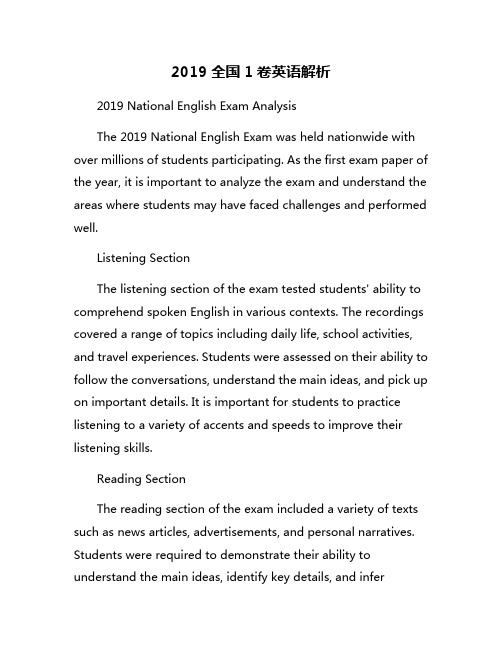
2019全国1卷英语解析2019 National English Exam AnalysisThe 2019 National English Exam was held nationwide with over millions of students participating. As the first exam paper of the year, it is important to analyze the exam and understand the areas where students may have faced challenges and performed well.Listening SectionThe listening section of the exam tested students' ability to comprehend spoken English in various contexts. The recordings covered a range of topics including daily life, school activities, and travel experiences. Students were assessed on their ability to follow the conversations, understand the main ideas, and pick up on important details. It is important for students to practice listening to a variety of accents and speeds to improve their listening skills.Reading SectionThe reading section of the exam included a variety of texts such as news articles, advertisements, and personal narratives. Students were required to demonstrate their ability to understand the main ideas, identify key details, and inferinformation from the text. Some students may have found the vocabulary challenging, so it is important for students to continue practicing reading and expanding their vocabulary.Writing SectionThe writing section of the exam tested students' ability to express their ideas clearly and coherently. Students were required to write a short essay on a given topic, such as "The Importance of Education" or "The Impact of Technology on Society." It is important for students to practice organizing their ideas, using appropriate vocabulary and grammar, and proofreading their work to improve their writing skills.Overall, the 2019 National English Exam provided students with an opportunity to demonstrate their English language proficiency. By analyzing the exam and understanding the areas where students may have faced challenges, students can focus on improving their skills in listening, reading, and writing to excel in future exams. With dedication and practice, students can continue to improve their English language abilities and achieve success in their academic and professional endeavors.。
公共英语一级语法解析

公共英语一级语法讲解一、【名词】1.名词的可数与不可数可数名词指表示的人或事物可以用数来计量,它有单数与复数两种形式。
不可数名词指所表示的事物不能用数来计量。
物质名词与抽象名词一般无法用数目,来统计,都成为不可数名词。
不可数名词前一般不能用冠词a、an来表示数量,没有复数形式。
要表示“一个……”这一概念,就须加a piece of这一类短语。
要注意许多名词在汉语里看来是可数名词,在英语里却不可数。
如:chalk,paper,bread,rice,grass,news,advice,information ,weather ,furniture(家具)等。
2.名词的复数(1)规则变化A.一般情况下加-s。
如:bike---bikes ,cake---cakesB.以s, x, ch, sh, 结尾的加-es。
如:bus---buses,box---boxes,watch---watches,brush---brushesC.以辅音字母加y结尾的改y为i再加-es。
如:city---cities,country---countries D.以f,fe结尾的,去掉f或fe,变成v再加-es。
如:knife---knives ,leaf---leaves但是有一些特殊的词汇:roof---roofs, chef---chefs, scarf---scarfs/scarves等等(2)不规则变化A.元音发生变化。
如:man---men,woman---women,foot---feet,tooth---teeth,mouse---miceB.词尾发生变化。
如:child---childrenC.单、复数同形。
如:fish---fish,Japanese---Japanese,Chinese---Chinese,sheep---sheep3.物质名词(不可数名词)量的表示方法(1)用much,a little,a lot of等表示(2)用容器表示a bowl of rice,a glass of water,a cup of tea,a piece of,orange,two glasses of milk,two pieces of paper4.名词的所有格(1) 名词所有格的构成法A.单数名词词尾加’ s,复数名词词尾若没有s,也要加’ s。
2019年公共英语一级考试词汇语法全员解析(8)
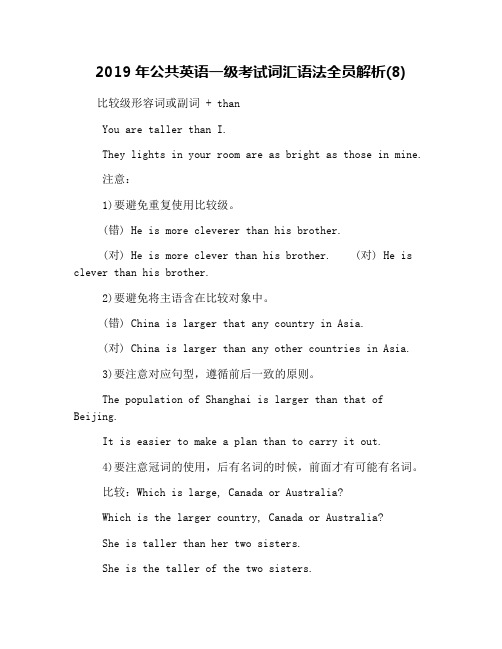
2019年公共英语一级考试词汇语法全员解析(8)比较级形容词或副词 + thanYou are taller than I.They lights in your room are as bright as those in mine.注意:1)要避免重复使用比较级。
(错) He is more cleverer than his brother.(对) He is more clever than his brother. (对) He is clever than his brother.2)要避免将主语含在比较对象中。
(错) China is larger that any country in Asia.(对) China is larger than any other countries in Asia.3)要注意对应句型,遵循前后一致的原则。
The population of Shanghai is larger than that of Beijing.It is easier to make a plan than to carry it out.4)要注意冠词的使用,后有名词的时候,前面才有可能有名词。
比较:Which is large, Canada or Australia?Which is the larger country, Canada or Australia?She is taller than her two sisters.She is the taller of the two sisters.可修饰比较级的词1)a bit, a little, rather, much, far, by far, many, a lot, lots, a great deal, any, still, even等2)还能够用表示倍数的词或度量名词作修饰语。
3)以上词(除by far)外,必须置于比较级形容词或副词的前面。
最新整理公共英语一级考试词汇语法全员解析(1)
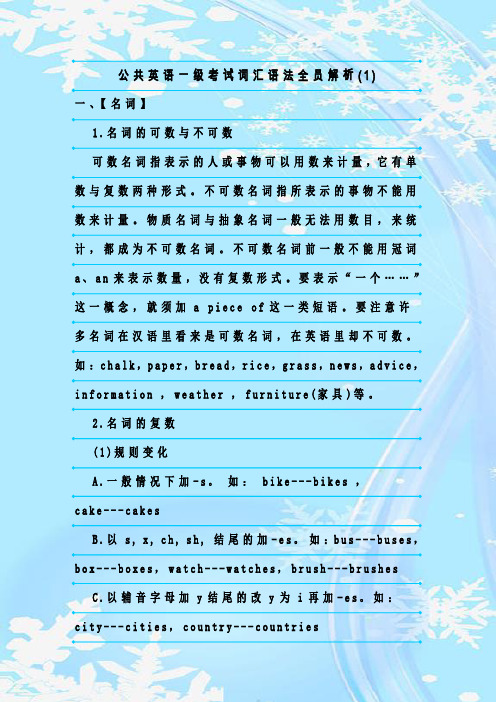
公共英语一级考试词汇语法全员解析(1)一、【名词】1.名词的可数与不可数可数名词指表示的人或事物可以用数来计量,它有单数与复数两种形式。
不可数名词指所表示的事物不能用数来计量。
物质名词与抽象名词一般无法用数目,来统计,都成为不可数名词。
不可数名词前一般不能用冠词a、a n来表示数量,没有复数形式。
要表示“一个……”这一概念,就须加a p i e c e o f这一类短语。
要注意许多名词在汉语里看来是可数名词,在英语里却不可数。
如:c h a l k,p a p e r,b r e a d,r i c e,g r a s s,n e w s,a d v i c e,i n f o r m a t i o n,w e a t h e r,f u r n i t u r e(家具)等。
2.名词的复数(1)规则变化A.一般情况下加-s。
如: b i k e---b i k e s,c a k e---c a k e sB.以s, x, c h, s h,结尾的加-e s。
如:b u s---b u s e s,b o x---b o x e s,w a t c h---w a t c h e s,b r u s h---b r u s h e sC.以辅音字母加y结尾的改y为i再加-e s。
如:c i t y---c i t i e s,c o u n t r y---c o u n t r i e sD.以f,f e结尾的,去掉f或f e,变成v再加-e s。
如:k n i f e---k n i v e s, l e a f---l e a v e s但是有一些特殊的词汇:r o o f---r o o f s,c h e f---c h e f s,s c a r f---s c a r f s/s c a r v e s等等(2)不规则变化A.元音发生变化。
如:m a n---m e n,w o m a n---w o m e n,f o o t---f e e t,t o o t h---t e e t h,m o u s e---m i c eB.词尾发生变化。
2019年公共英语一级口语辅导精华(7)

2019年公共英语一级口语辅导精华(7) Speaking of the devil!一说曹操,曹操就到!
Stay away from me!离我远一点!
Stay on the ball!集中注意力!
That makes no difference.不都一样吗?
That's a touchy issue!这是个辣手得问题!
That's always the case!习以为常!
That's going too far!这太离谱了!
That's more like that!这才象话嘛!
The answer is zero!白忙了!
The dice is cast!已成定局了!
The same as usual!一如既往!
The walls have ears!隔墙有耳!
There you go again!你又来了!
Time is running out!没有时间了!
We better get going!马上就走!
Absence makes the heart grow fonder. 小别胜新婚。
After you. 您先。
Allow me. 让我来。
Any day will do. 哪一天都行夕
Any messages for me? 有我的留言吗?
Any thing else? 还要别的吗? Any urgent thing? 有急事吗? Are you kidding? 你在开玩笑吧!。
最新整理公共英语一级考试词汇语法全员解析(7)

公共英语一级考试词汇语法全员解析(7)a s+形容词或副词原级 +a s1)在否定句或疑问句中可用s o… a s。
H e c a n n o t r u n s o/a s f a s t a s y o u.2)当a s… a s中间有名词时采用以下格式。
a s+形容词+a+单数名词a s+m a n y/m u c h+名词T h i s i s a s g o o d a n e x a m p l e a s t h e o t h e r i s.I c a n c a r r y a s m u c h p a p e r a s y o u c a n..3)用表示倍数的词或其它程度副词做修饰语时,放在a s的前面。
T h i s r o o m i s t w i c e a s b i g a s t h a t o n e.Y o u r r o o m i s t h e s a m e s i z e a s m i n e.4)倍数+a s+a d j.+a s倍数+t h e n+o fT h i s b r i d g e i s t h r e e t i m e s a s l o n g a s t h a t o n e. T h i s b r i d g e i s t h r e e t i m e s t h e l e n g t h o f t h a t o n e.Y o u r r o o m i s t w i c e a s l a r g e a s m i n e.Y o u r r o o m i s t w i c e t h e s i z e o f m i n e.t h e+级 +比较范围1) T h e S a h a r a i s t h e b i g g e s t d e s e r t i n t h e w o r l d.形容词级前通常必须用定冠词 t h e,副词级前可不用。
全国统一高考英语2019 I 卷阅读理解 重点单词短及翻译

全国卷阅读理解2019 IA单词短语:depend on /upon sth取决于,受...影响build/bɪld/( built, built) v.逐渐增强employ ment n. 工作,职业along with 随同,一起hands-on 亲自实践的;实际动手操作的up to sth 达到(某数量、程度等),至多有run v.管理,经营;提供,开设(服务课程等)steward ship n. 管理,看管,组织工作ranger n. 园林管理人,护林人resource n.资源hire/'haɪə/ v. 聘用,录用a variety of 各种各样的position/ pəˈzɪʃn / n.(工作)职位,职务service/'sɜ:(r)vɪs/ n.公共事业机构(或公司);公共服务系统agen cy /ˈeɪdʒənsi/ n. 服务机构; (尤指)代理机构agent /'eɪdʒənt/ n.代理人;经纪人related agency 相关机构Need a Job This Summer?The provincial government and its partners offer many programs to help students find summer jobs. The deadlines and what you need to apply depend on the program.Not a student? Go to the government website to learn about programs and online tools available to help people under 30 build skills, find a job or start businesses all year round. Jobs for YouthIf you are a teenager living in certain parts of the province, you could be eligible(符合条件)for this program. Which provides eight weeks of paid employment along with training.Who is eligible: Youth 15-18 years old in select communities(社区).Summer CompanySummer Company provides students with hands-on business training and awards of up to $3,000 to start and run their own summer businesses.Who is eligible: Students aged 15-29, returning to school in the fall.Stewardship Youth Ranger ProgramYou could apply to be a Stewardship Youth Ranger and work on local natural resource management projects for eight weeks this summer.Who is eligible: Students aged 16 or 17 at time of hire, but not turning 18 before December 31 this year.Summer Employment Opportunities(机会)Through the Summer Employment Opportunities program, students are hired each year in a variety of summer positions across the Provincial Public Service, its related agencies and community groups.Who is eligible: Students aged 15 or older. Some positions require students to be 15 to 24 or up to 29 for persons with a disability.21. What is special about Summer Company?A. It requires no training before employment.B. It provides awards for running new businesses.C. It allows one to work in the natural environment.D. It offers more summer job opportunities.22. What is the age range required by Stewardship Youth Ranger Program?A. 15-18.B. 15-24.C. 15-29.D. 16-17.23. Which program favors the disabled?A. Jobs for Youth.B. Summer Company.C. Stewardship Youth Ranger Program.D. Summer Employment Opportunities.这个夏天需要一份工作吗?省政府及其合作伙伴提供许多方案帮助学生找暑期工作。
2019年全国高考英语卷(一)语法考点

2019年全国高考英语卷(一)语法考点
2019年全国高考英语卷(一)语法考点
七.非谓语动词之动名词
我们来看2019年全国高考英语卷(一)语法填空题第67题。
Scientists have responded by 67 (note) that hungry bears may be congregating(聚集) around human settlements, leading to the illusion(错觉) that populations are 68 (high) than they actually are.
简析:Scientists have responded这是句子的主谓(主干)部分,by 67 (note) that hungry bears may be congregating(聚集) around human settlements 是一个由介词by引导的短语——方式状语。
By是介词,所以,它后面的形式应该用-ing形式,即,noting: 动名词作介词的宾语。
在此,再举几例动名词的句法功能的例子,供参考:
1.主语:Smoking is a bad habit.
It is no use arguing with him.
2.表语:His job is building houses.
3.宾语:He is fond of playing football.
Would you mind my closing the door.
4.定语:You can learn to swim in the swimming pool.
5.同位语:His job, building a house, is almost done.。
2019高考英语全国一卷高频词汇

2019年全国一卷1.visiting hours2.get/be in shape3.join the gym4.the position advertised in Friday’s Daily Mail5.own that business for 15 years6.discourage the seabirds from wandering onto the highwayencourage the man to pursue his dream7.help/lack our motivation8.feel embarrassed/concerned/disappointed9.hold/ adopt/ have a disapproving/ambiguous/understanding attitudetoward/to sb./ sth.10.host a program11.conduct a job interview12.recommend an exercise13.support his findings14.the eligible/proper/suitable applicants/participants/candidates15.Provide sb. _______awards/ provide awards _______ sb.16.Award sb sth./award sth. ______ sb.17.the age range/ a wide range of books/ range _______ time _____ time18.depend on the weather/the projectYou can depend on _____ that we will complete the task.19.spend time/money ______ sth./(________) doing20.apply to sb. for sth./apply to do/apply the new method to solving problems21.want/need/require _________________ (water)22.except for23.boast about yourself and your best qualities24.infer the meaning of the underlined word/ such a/an ______________(infer)25.assess /judge/examine/value your speaking skills26.a humorous/ ambitious/ caring /demanding/ reliable/ diligent /considerate/generous/ mean/ stubborn/ cooperative/ competitive/ selfless/ selfish/ independent / dependent man27.in adolescence/______________(青少年) aged from 13 to 1528.engage in dangerous jobs/careers/workse to a ______________(conclude)30.be popular __________ sb./the __________(popular) of online shopping31.analyze the phenomenon/ the ____________(analyze) of the phenomenon32.all sort/kinds ofsort the popularity into two _____________ (category)33.be responsible for these unpleasant outcomes/consequences/results34.tend to do/ have a ________ (tend) to do35.rise in the ranks/ rank first in his class36.social psychology37.keep a high social status38.strengths and weaknesses/ strengthen the relationship between theory andpractice.39.advantages and _____________40.have access to computers41.Spring _______________ (approach).With the spring ______________, outdoor activities become more and more popular.Don’t approach the insect.42.age and harm our skin43.lead to a _________ (believe)44.permanent/contemporary/temporary45.deserve his reputation46.method ______ tracking polar bearsway ___________ (track)by means _____ lectures47.__________(hear) the story, I am skeptical about the place.All the football players cheered loudly, ________(say) I had a talent for football.________(keep) in contact with my old friends, we get together once a year.________(see) from the top of the mountain, Baoji is a beautiful city.48.Sb. come up with a good idea.49.have an interest ______ = be ___________ in50.sb. be familiar _____ sth.51.sb. be qualified _____ the job.52.Here _____ (be) the specific introduction/detailed information/details.53.The reasons ______ I am qualified for the job _____ as follows.54.If I _______ you, I _______________(try) it again.55.It would be a good idea _________ you do as I tell you.56.To one’s surprise/delight/amusement/astonishment57.Exercise ___________ (benefit) our health.Exercise is of benefit _____ our health.Exercise is ____________ to our health.Our health benefits _________ exercise.58.be likely ___________(do)It is likely __________ we will finish our task ahead of time.59.recognize different participantsrealize my dream/fault60.be in favor of your recommendation/advice/suggestionsdo sb. a favorfavor the disabled。
2019年公共英语一级考试词汇语法全员解析(6)
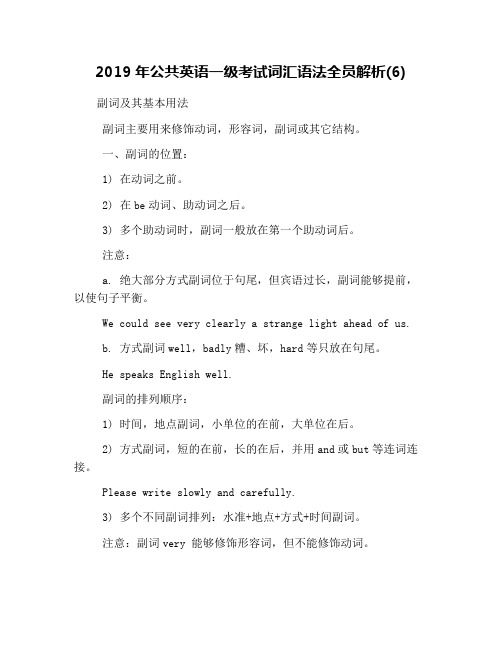
2019年公共英语一级考试词汇语法全员解析(6)副词及其基本用法副词主要用来修饰动词,形容词,副词或其它结构。
一、副词的位置:1) 在动词之前。
2) 在be动词、助动词之后。
3) 多个助动词时,副词一般放在第一个助动词后。
注意:a. 绝大部分方式副词位于句尾,但宾语过长,副词能够提前,以使句子平衡。
We could see very clearly a strange light ahead of us.b. 方式副词well,badly糟、坏,hard等只放在句尾。
He speaks English well.副词的排列顺序:1) 时间,地点副词,小单位的在前,大单位在后。
2) 方式副词,短的在前,长的在后,并用and或but等连词连接。
Please write slowly and carefully.3) 多个不同副词排列:水准+地点+方式+时间副词。
注意:副词very 能够修饰形容词,但不能修饰动词。
改错:(错) I very like English. (对) I like Englishvery much.注意:副词enough要放在形容词的后面,形容词enough放在名词前后都可。
I don't know him well enough.There is enough food for everyone to eat.There is food enough for everyone to eat兼有两种形式的副词1) close与closelyclose意思是"近"; closely 意思是"仔细地"He is sitting close to me. Watch him closely.2) late 与latelylate意思是"晚"; lately 意思是"最近"You have come too late. What have you been doing lately?3) deep与deeplydeep意思是"深",表示空间深度;deeply时常表示感情上的深度,"深深地"He pushed the stick deep into the mud.Even father was deeply moved by the film.4) high与highlyhigh表示空间高度;highly表示水准,相当于muchThe plane was flying high. I think highly of your opinion.5) wide与widelywide表示空间宽度;widely意思是"广泛地","在很多地方"He opened the door wide. English is widely used inthe world.6) free与freelyfree的意思是"免费";freely 的意思是"无限制地"You can eat free in my restaurant whenever you like.You may speak freely; say what you like.形容词和副词的比较等级比较等级分为原级、比较级和级。
2019全国1卷英语解析
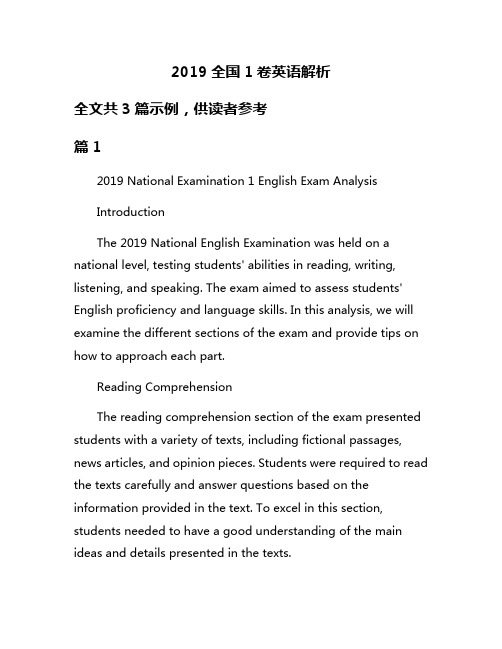
2019全国1卷英语解析全文共3篇示例,供读者参考篇12019 National Examination 1 English Exam AnalysisIntroductionThe 2019 National English Examination was held on a national level, testing students' abilities in reading, writing, listening, and speaking. The exam aimed to assess students' English proficiency and language skills. In this analysis, we will examine the different sections of the exam and provide tips on how to approach each part.Reading ComprehensionThe reading comprehension section of the exam presented students with a variety of texts, including fictional passages, news articles, and opinion pieces. Students were required to read the texts carefully and answer questions based on the information provided in the text. To excel in this section, students needed to have a good understanding of the main ideas and details presented in the texts.Tips for Reading Comprehension:1. Skim the text first to get an overall idea of the content.2. Pay attention to key words and phrases that indicate the main idea or important information.3. Take your time to read carefully and understand the text before answering the questions.WritingThe writing section of the exam required students to write an essay on a given topic. Students needed to demonstrate their ability to organize their thoughts coherently and express their ideas effectively. To do well in this section, students needed to plan their essay carefully, structure their ideas logically, and use appropriate language and vocabulary.Tips for Writing:1. Plan your essay before you start writing. Choose a clear thesis statement and supporting arguments.2. Structure your essay with an introduction, body paragraphs, and a conclusion.3. Use a variety of sentence structures and vocabulary to make your essay more interesting and sophisticated.ListeningIn the listening section of the exam, students listened to a series of audio recordings and answered questions based on the information presented in the recordings. Students needed to pay close attention to details and be able to follow the content of the recordings.Tips for Listening:1. Focus on the main idea of the recording and take notes if necessary.2. Listen for key information, such as dates, names, and locations.3. Practice listening to English audio material regularly to improve your listening skills.SpeakingThe speaking section of the exam required students to participate in a conversation with the examiner. Students were asked to answer questions and engage in a discussion on various topics. To do well in this section, students needed to speak clearly, express their ideas coherently, and engage with the examiner in a confident manner.Tips for Speaking:1. Practice speaking English regularly to improve your fluency and pronunciation.2. Think before you speak and organize your thoughts before answering questions.3. Listen carefully to the examiner and respond to their questions in a clear and concise manner.ConclusionIn conclusion, the 2019 National English Examination tested students' abilities in reading, writing, listening, and speaking. To succeed in the exam, students needed to have a good understanding of English grammar and vocabulary, as well as strong communication skills. By following the tips provided in this analysis, students can improve their performance in each section of the exam and achieve success in their English studies.篇22021年高考英语考试已经结束,以下为2019年全国1卷英语试题的解析:Part I Listening (25 minutes)Section A:In this section, there are five short conversations. In each conversation, you will hear some questions. Both the conversation and the questions will be read only once. After you hear a question, you must choose the best answer from the four choices marked A, B, C and D and decide which one is the best choice.1. A. Sunny. B. Rainy. C. Cloudy. D. Windy.2. A. Cake. B. Cookies. C. Ice cream. D. Popcorn.3. A. Delivering a package. B. Fixing a computer.4. A. She’s not supposed to eat. B. She’s missed an important date.5. A. The new shoes were expensive. B. The new shoes are uncomfortable.Section B:In this section, you will hear a passage. The passage is read for the second time. Choose the best answer to each question based on what you have heard.6. A. He thinks the class is boring. B. He can’t attend the class. C. He has to leave early.7. A. A teacher. B. A student. C. A journalist.8. A. Language difficulties. B. Time pressures. C. Family problems.9. A. 9:30. B. 9:20. C. 9:10.10. A. In Rome. B. In Paris. C. In Berlin.Part II Reading Comprehension (35 minutes)Section A:This section consists of three passages, each followed by some questions based on what you have just heard. The questions are in the form of multiple choice or true/false/not given questions.Passage 1:11-15 CABBBPassage 2:16-20 DBDCAPassage 3:21-25 CCBAASection B:In this section, there are four passages. For each passage, there are five multiple choice questions, followed by five true/false/not given questions.Passage 1:26-30 CABDC31-35 TTFTFPassage 2:36-40 DBDCA41-45 FTFFTPassage 3:46-50 ACBDA51-55 FTTFFPassage 4:56-60 BACAD61-65 TFFTPart III Vocabulary and Grammar (30 minutes)66. D 67. C 68. B 69. A 70. C71. B 72. D 73. C 74. D 75. A76. B 77. A 78. C 79. D 80. B81. D 82. A 83. B 84. C 85. APart IV Writing (35 minutes)In this part, write a short passage within 120 words about one of the following topics:1. My favorite book and why I like it.2. An unforgettable experience in my life.3. The importance of learning English.Example:An unforgettable experience in my lifeOne of the most unforgettable experiences in my life was the time I went skydiving for the first time. It was a gift from my friends for my birthday, and I was filled with both excitement and fear. As the plane soared higher into the sky, my heart raced and my palms grew sweaty. The moment the instructor told me to jump, I felt a rush of adrenaline unlike anything I had ever experienced before. The feeling of free falling was indescribable, and as the parachute opened and we floated gently back to the ground, I knew that I had just conquered one of my biggest fears. This experience taught me the importance of facing my fearshead on and seizing the moment, as life is too short to let opportunities pass by.I hope this detailed analysis of the 2019 National English Exam Paper 1 helps you in your revision and preparation for the upcoming exams. Good luck!篇32019 National Examination English Paper 1 AnalysisSection A: Reading1. Multiple Choice QuestionsQuestion 1: The passage reports findings on teenagers’ favorite apps and _____.A) what they do with their smartphonesB) the number of hours they spend on their phonesC) their attitudes towards social mediaD) the impact of social media on their behaviorIn this question, the correct answer is A) what they do with their smartphones. The passage discusses teenagers' app preferences and their usage patterns, not just the number of hours spent or attitudes towards social media.Question 2: In the passage, Snapchat is mentioned as an app that allows users to _____.A) send disappearing messagesB) edit photos with filtersC) connect with friendsD) watch live videosThe correct answer is A) send disappearing messages. Snapchat is known for its feature where messages disappear after being viewed by the recipient.Question 3: According to the passage, what do teenagers claim to be the main reason for using Instagram?A) To share photos with friendsB) To follow celebritiesC) To stay updated with newsD) To communicate with familyThe answer is A) To share photos with friends. The passage indicates that teenagers use Instagram primarily for sharing photos with their friends.2. Short Answer QuestionsQuestion 4: What is the message conveyed in the passage regarding teenagers' app usage?The passage suggests that teenagers are heavily reliant on social media apps for communication and entertainment, with Snapchat and Instagram being popular choices for this age group.Question 5: How do teenagers view the impact of social media on their lives, according to the findings?Teenagers in the study feel that social media enhances their social connections, allows them to express themselves creatively, and provides a platform for staying informed about current trends.Section B: Writing1. Essay QuestionWrite an essay discussing the advantages and disadvantages of teenagers using social media. Use specific examples to support your points.In your essay, you should address the potential benefits of social media, such as facilitating communication and creativity, as well as the negative aspects like cyberbullying and addiction.Support your arguments with relevant examples and personal experiences.Overall, the 2019 National Examination English Paper 1 provides insight into teenagers' social media habits and attitudes. It highlights the importance of understanding the impact of technology on this demographic and encourages critical thinking about the benefits and drawbacks of online platforms.。
2019年公共英语等级考试一级单项填空技巧2

2019年公共英语等级考试一级单项填空技巧2二、命题规律英语知识使用部分考查考生的语言知识和语篇分析水平,要求考生具有扎实的语法基础和较好的阅读理解水平,同时对各类词法、句法、上下文逻辑关系、语义搭配等具有较强的使用水平,考查的形式与单句的选择填空相似,内容与一般外语测试中的语法和词汇部分大致相同。
具体来说,就是包括词汇、语法、惯用法等各方面在内的英语应用或接受水平。
单项填空侧重考查语法结构、一些单词和表达方式(其中有10~12道题考查语法结构,3~5道题考查单词和表达方式)。
单项填空是PETS第一级英语知识使用部分的主要题型之一。
出题形式是在主题干中设空,然后从A、B、C三个选项中,选出能够填入空白处的选项。
该节考查内容丰富,覆盖面广,涉及考生在教材中所学的语法知识、习语、惯用法和词汇辨析。
目的在于考查考生对英语基础知识的掌握水准及灵活使用水平。
1.语法结构考查语法结构的题在这个节试题中占很大比重。
考查的主要语法点包括:名词的单复数;名词所有格;基数词和序数词;形容词和副词的比较级、级;代词、介词、冠词、连词等的用法;情态动词及助动词;动词时态及各种变化形式;宾语从句;状语从句等等。
特别应注意的是特定语境中使用的时态、语态和惯用语。
【例题1】Twelve were hurt, but no were lost in that accident.[A]person, life[B]people, lives[C]peoples, lives【准确答案】B【考查要点】名词的单复数、主谓一致。
【名师详解】这里是集合名词,指“人们”,单复数同形,后面是指“生命”,此处根据后面的谓语动词were, 应用life的复数形式lives,故选B。
【例题2】mum had asked Mike to close the windows before he went out, Mike forget to do so.[A]Though,不填[B]Though, but[C]Till,不填【准确答案】A【考查要点】连词的准确使用。
2019年高考英语全国卷I 词汇

阅读Aprovincial /prəˈvɪnʃəl/ n. 省级的government /ˈɡʌvərmənt/ n. 政府partners /ˈpɑːtnərz/ n. 合作伙伴programs /ˈproʊɡræmz/ n. 计划deadlines /ˈdɛdˌlaɪnz/ n. 截止日期depend /dɪˈpɛnd/ v. 取决于available /əˈveɪləbl/ adj. 可用的skills /skɪlz/ n. 技能businesses /ˈbɪznɪsɪz/ n. 企业teenager /ˈtiːnˌeɪdʒər/ n. 青少年eligible /ˈɛlɪdʒəbl/ adj. 有资格的provides /prəˈvaɪdz/ v. 提供employment /ɪmˈplɔɪmənt/ n. 就业training /ˈtreɪnɪŋ/ n. 培训stewardship /ˈstuːərdʃɪp/ n. 管理ranger /ˈreɪndʒər/ n. 护林员management /ˈmænɪdʒmənt/ n. 管理opportunities /ˌɑːpərˈtuːnɪtiz/ n. 机会positions /pəˈzɪʃənz/ n. 职位agencies /ˈeɪdʒənsiz/ n. 机构community /kəˈmjuːnəti/ n. 社区disability /dɪsˈsɪlɪti/ n. 残疾Bpronunciation /prəˌnʌnsiˈeɪʃən/ n. 发音non-native /nɒn ˈneɪtɪv/ adj. 非母语的immigrant /ˈɪmɪɡrənt/ n. 移民recalls /rɪˈkɔːlz/ v. 回忆起painful /ˈpeɪnfəl/ adj. 痛苦的presidential /ˌprɛzɪˈdɛnʃəl/ adj. 总统的project /ˈprɒdʒɛkt/ n. 项目qualities /ˈkwɒlɪtiz/ n. 质量boast /bəʊst/ v. 自夸Cidentity /aɪˈdɛntɪti/ n. 身份theft /θɛft/ n. 盗窃common /ˈkɒmən/ adj. 普遍的market /ˈmɑːrkɪt/ n. 市场technologies /tɛkˈnɒlədʒiz/ n. 技术researchers /rɪˈsɜːrtʃərz/ n. 研究人员device /dɪˈvaɪs/ n. 设备measure /ˈmɛʒər/ v. 测量analyze /ˈænəˌlaɪz/ v. 分析determine /dɪˈtɜːrmɪn/ v. 确定access /ˈæksɛs/ n. 访问technology /tɛkˈnɒlədʒi/ n. 技术familiar /fəˈmɪliər/ adj. 熟悉的commercialize /ˈkɒmərʃəlaɪz/ v. 商业化error /ˈɛrər/ n. 错误plastic /ˈplæstɪk/ adj. 塑料的parts /pɑːrts/ n. 部件connection /kəˈnɛkʃən/ n. 连接keyboard /ˈkiːˌbɔːrd/ n. 键盘Drosy /ˈroʊzi/ adj. 美好的tweens /twiːnz/ n. 十一到十三岁的孩子status /ˈsteɪtəs/ n. 地位social psychology /ˈsoʊʃəl saɪˈkɒlədʒi/ n. 社会心理学interpersonal /ˌɪntərpɜːrˈsoʊnl/ adj. 人际关系的unpleasant /ʌnˈplɛznt/ adj. 令人不愉快的consequences /ˈkɑːnsɪˌkwɛnsɪz/ n. 结果dishonorable /dɪsˈɒnərəbl/ adj. 不光彩的likability /ˌlaɪkəˈbɪləti/ n. 亲和力aggression /əˈɡrɛʃən/ n. 侵略行为adjustment /əˈdʒʌstmənt/ n. 调整responsibility /rɪˌspɒnsəˈbɪləti/ n. 责任outcomes /ˈaʊtkʌmz/ n. 结果opportunities /ˌɒpərˈtuːnɪtiz/ n. 机会advantages /ədˈvæntɪdʒɪz/ n. 优势analysis /əˈnæləsɪs/ n. 分析conclusion /kənˈkluːʒən/ n. 结论experience /ɪkˈspɪriəns/ n. 经验relate /rɪˈleɪt/ v. 联系七选五fresh /frɛʃ/ adj. 新鲜的recent /ˈriːsnt/ adj. 最近的camping /ˈkæmpɪŋ/ n. 野营energizing /ˈɛnərˌdʒaɪzɪŋ/ adj. 充满活力的oxygen /ˈɑːksɪdʒən/ n. 氧气smog /smɑːɡ/ n. 烟雾muscles /ˈmʌsəlz/ n. 肌肉brain /breɪn/ n. 大脑connection /kəˈnɛkʃən/ n. 连接healing /ˈhiːlɪŋ/ n. 治愈patients /ˈpeɪʃənts/ n. 患者stress /strɛs/ n. 压力blood pressure 血压mood /muːd/ n. 心情greenery /ˈɡriːnəri/ n. 绿色植物branches /ˈbrænʧɪz/ n. 树枝recover /rɪˈkʌvər/ v. 康复rays /reɪz/ n. 光线beneficial /ˌbɛnɪˈfɪʃəl/ adj. 有益的Vitamin D 维生素Dsunscreen /ˈsʌnsk riːn/ n. 防晒霜absorb /əbˈsɔːrb/ v. 吸收完型填空attempt /əˈtɛmpt/ v. 试图,尝试waste /weɪst/ n. 浪费,废物glaciers /ˈɡleɪʃərz/ n. 冰川concerned /kənˈsɜrnd/ adj. 担心的pollution /pəˈluːʃən/ n. 污染challenges /ˈtʃæləndʒɪz/ n. 挑战effective /ɪˈfɛktɪv/ adj. 有效的regarded /rɪˈɡɑːrdɪd/ adj. 被认为的connection /kəˈnɛkʃən/ n. 连接transition /trænˈzɪʃən/ n. 过渡observe /əbˈzɜrv/ v. 观察plateau /ˈplætoʊ/ n. 高原eventually /ɪˈvɛntʃuəli/ adv. 最终melting /ˈmɛltɪŋ/ v. 融化maintain /meɪnˈteɪn/ v. 保持选项mix /mɪks/ v. 混合connect /kəˈnɛkt/ v. 连接crowds /kraʊdz/ n. 人群reporters /rɪˈpɔːrtərz/ n. 记者position /pəˈzɪʃən/ n. 位置silent /ˈsaɪlənt/ adj. 沉默的skeptical /ˈskɛptɪkəl/ adj. 怀疑的serious /ˈsɪriəs/ adj. 认真的crazy /ˈkreɪzi/ adj. 疯狂的argue /ˈɑːrɡjuː/ v. 争论advocate /ˈædvəkət/ v. 提倡equipment /ɪˈkwɪpmənt/ n. 设备camps /kæmps/ n. 营地remote /rɪˈmoʊt/ adj. 偏远的语法填空polar /ˈpoʊlər/ adj. 极地的masses /ˈmæsɪz/ n. 大片Newfoundland n. 纽芬兰岛(加拿大省份)rare /rɛər/ adj. 稀少的evidence /ˈɛvɪdəns/ n. 证据figure /ˈfɪɡjər/ v. 计算global /ˈɡloʊbl/ adj. 全球的calculate /ˈkælkjəˌleɪt/ v. 计算tracking /ˈtrækɪŋ/ n. 追踪employed /ɪmˈplɔɪd/ adj. 雇佣的consistent /kənˈsɪstənt/ adj. 一致的perform /pərˈfɔrm/ v. 执行Inuit /ˈɪnuɪt/ n. 因纽特人(北极地区土著民族)settlements /ˈsɛtlmənts/ n. 定居点illusion /ɪˈluʒən/ n. 错觉increasing /ɪnˈkriːsɪŋ/ adj. 增加的note /noʊt/ v. 指出congregating /ˈkɑːŋɡrɪˌɡeɪtɪŋ/ v. 聚集subpopulations /sʌbˌpɑpjəˈleɪʃənz/ n. 亚种群declining /dɪˈklaɪnɪŋ/ adj. 下降的stable /ˈsteɪbl/ adj. 稳定的lack /læk/ v. 缺乏。
2019高考英语全国Ⅰ卷语法填空题精细解析课件.doc

2019 高考英语全国Ⅰ卷语法填空题精细解析黑龙江绥化一中高云峰第二节(共10 小题;每小题 1.5 分,满分15 分)阅读下面短文,在空白处填入 1 个适当的单词或括号内单词的正确形式The polar bear is found in the Arctic Circle and some big land masses as far south as Newfoundland. While they are rare north of 88, there is evidence 61 they range all the way across the Arctic, and as far south as James Bay in Canada. It is difficult to figure out a global population of polar bears as much of the range has been 62 (poor) studied ;however, biologists calculate that there are about 20,000-25,000 polar bears worldwide.Modern methods 63 tracking polar bear populations have been employed only since the mid-1980s, and are expensive 64 (perform) consistently over a large area. In recent years some Inuit people in Nunavut 65 (report) increases in bear sightings around human settlements, leading to a 66 (believe) that populations are increasing. Scientists have responded by 67 (note) that hungry bears may be congregating (聚集) around human settlements, leading to the illusion( 错觉) that populations are 68 (high) than they actually are. Of 69 nineteen recognized polar bear accumulation, three are declining, six 70 (be) stable, one is increasing, and nine lack enough data.【61 题】句子连接关系题→同位语从句题。
公共英语一级的重点短语
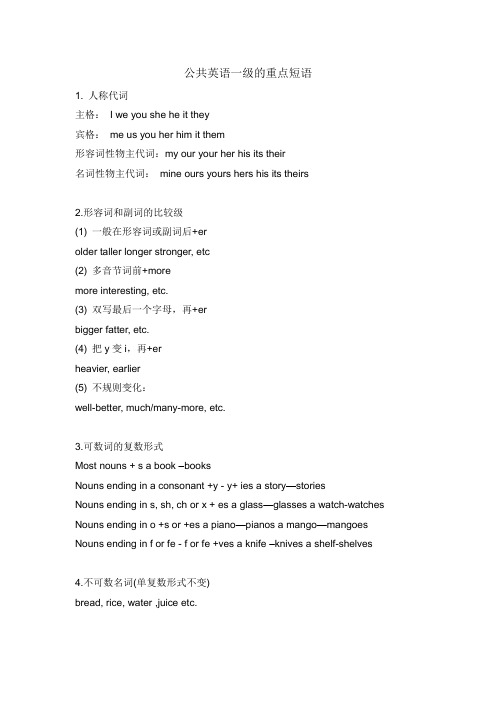
公共英语一级的重点短语1. 人称代词主格:I we you she he it they宾格:me us you her him it them形容词性物主代词:my our your her his its their名词性物主代词:mine ours yours hers his its theirs2.形容词和副词的比较级(1) 一般在形容词或副词后+erolder taller longer stronger, etc(2) 多音节词前+moremore interesting, etc.(3) 双写最后一个字母,再+erbigger fatter, etc.(4) 把y变i,再+erheavier, earlier(5) 不规则变化:well-better, much/many-more, etc.3.可数词的复数形式Most nouns + s a book –booksNouns ending in a consonant +y - y+ ies a story—storiesNouns ending in s, sh, ch or x + es a glass—glasses a watch-watches Nouns ending in o +s or +es a piano—pianos a mango—mangoes Nouns ending in f or fe - f or fe +ves a knife –knives a shelf-shelves4.不可数名词(单复数形式不变)bread, rice, water ,juice etc.5. 缩略形式I’m = I am you’re = you are she’s = she is he’s = he isit’s = it is who’s =who is can’t =can not isn’t=is not etc6. a/ana book, a peachan egg an hour7. Preposition:on, in ,in front of, between, next to, near, beside, at, behind.表示时间:at six o’clock, at Christmas, at breakfaston Monday on 15th July On National Dayin the evening in December in winter8. 基数词和序数词one – first two-second twenty-twentieth9. Some /anyI have some toys in my bedroom.Do you have any brothers or sisters?10. be 动词(1) Basic form: am/are/is(2) 肯定和否定句I am(not) from London.My eyes are(not) small.My hair is(not) long.(3)一般疑问句:Am I a Chniese? Yes, you are. No, you aren’t. Are they American? Yes, they are. No, they aren’t.Is the cat fat? Yes, it is. No, it isn’t.11. there be 结构肯定句:There is a …There are …一般疑问句:Is there …? Yes, there is./ No, there isn’t.Are there…? Yes, there are. /No, there aren’t.否定句:There isn’t …. There aren’t….12. 祈使句Sit down pleaseDon’t sit down, please.13. 现在进行时.通常用“now”.形式:be + verb +ingeg: I am(not) doing my homework.You/We/They are(not) reading.He/She/It is(not) eating.动词—ing 的形式Most verbs +ing walk—walkingVerbs ending in e -e + ing come—comingShort verbs ending in a vowel + a consonant run –running swim—swimming14 一般现在时。
- 1、下载文档前请自行甄别文档内容的完整性,平台不提供额外的编辑、内容补充、找答案等附加服务。
- 2、"仅部分预览"的文档,不可在线预览部分如存在完整性等问题,可反馈申请退款(可完整预览的文档不适用该条件!)。
- 3、如文档侵犯您的权益,请联系客服反馈,我们会尽快为您处理(人工客服工作时间:9:00-18:30)。
2019年公共英语一级考试词汇语法全员解析(7)
as + 形容词或副词原级 + as
1)在否定句或疑问句中可用so… as。
He cannot run so/as fast as you.
2)当as… as 中间有名词时采用以下格式。
as +形容词+ a +单数名词
as + many/much +名词
This is as good an example as the other is.
I can carry as much paper as you can..
3)用表示倍数的词或其它水准副词做修饰语时,放在as的前面。
This room is twice as big as that one.
Your room is the same size as mine.
4) 倍数+ as + adj. + as 倍数+ then + of
This bridge is three times as long as that one.
This bridge is three times the length of that one.
Your room is twice as large as mine.
Your room is twice the size of mine.
the + 级 + 比较范围
1) The Sahara is the biggest desert in the world.
形容词级前通常必须用定冠词 the,副词级前可不用。
形容词most前面没有the,不表示级的含义,只表示"非常"。
It is a most important problem. =It is a very important problem.
注意:使用级要注意将主语包括在比较范围内。
(错)Tom is the tallest of his three brothers.
(对)Tom is the tallest of the three brothers.
2) 下列词可修饰级,by far, far, much, mostly, almost
This hat is nearly/almost the biggest.
注意: a. very可修饰级,但位置与much不同。
This is the very best.
This is much the best.
b. 序数词通常只修饰级。
Africa is the second largest continent.
3) 句型转换:
Mike is the most intelligent in his class.
Mike is more intelligent than any other students in his class.
4) "否定词语+比较级","否定词语+ so… as"结构表示级含义。
Nothing is so easy as this.=Nothing is easier than this.
=This is the easiest thing.。
